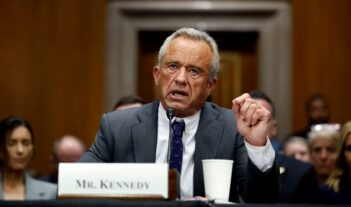
Federal court pauses Affordable Care Act eligibility changes, the Supreme Court blocks National Institutes of Health grant restorations, and more…
IN THE NEWS
- The U.S. District Court for the District of Maryland stayed seven provisions of a Centers for Medicare & Medicaid Services rule that shortened sign-up periods and increased eligibility verification for Affordable Care Act plans. U.S. Health and Human Services Secretary Robert F. Kennedy, Jr., stated that the rule was intended to lower marketplace premiums, expand coverage for families, and ensure that “illegal aliens do not receive taxpayer-funded health insurance.” The lawsuit, brought by the non-profit Democracy Forward on behalf of three cities, a coalition of doctors, and an interest group representing small business owners, alleged that the plaintiffs would bear the increased costs or see their members lose health insurance coverage if the rule was implemented. The district court found that there was a strong likelihood that the plaintiffs would succeed on their challenges to seven of the rule’s most consequential provisions, but ruled that the plaintiffs failed to show likelihood of success on the challenges to the two other provisions of the rule.
- The U.S. Supreme Court temporarily halted a lower court order that required the National Institutes of Health to restore over 1,200 health research grants that the Trump Administration contends advance diversity, equity, and inclusion (DEI) efforts or “gender ideology extremism.” The Court relied on a decision earlier this year in which it held that claims against the government to remedy grant terminations had to be brought in the U.S. Court of Federal Claims rather than a federal district court. Justice Ketanji Brown Jackson dissented in part, arguing that this decision would halt the “forward march of scientific discovery.”
- The U.S. Department of Health and Human Services (HHS) issued a directive to 46 states and territories to remove references to gender ideology from sex education materials funded by the Personal Responsibility Education Program (PREP). The action followed the termination of California’s PREP grant for non-compliance, giving states 60 days to comply or risk losing over $81 million in funding. Supporters praised the move for protecting children from ideological agendas and aligning with congressional intent, while critics argued that the directive promotes bias over science and restricts access to comprehensive health education.
- The U.S. Court of Appeals for the Ninth Circuit temporarily stayed a lower court decision blocking the Trump Administration’s termination of Temporary Protected Status (TPS) for immigrants from Nicaragua, Honduras, and Nepal while the Ninth Circuit considers the merits of the case. The Department of Homeland Security celebrated this ruling as a “legal victory,” stating that it will “help restore integrity to our immigration system.” This decision would allow the Trump Administration to strip TPS holders from these countries of their work permits and begin deportations, pending the Ninth Circuit’s final ruling.
- A federal judge ruled that the Trump Administration can withhold Medicaid funding from Maine Family Planning, the largest network of reproductive health care clinics in Maine, under the One Big Beautiful Bill Act, denying the provider’s request for a preliminary injunction. The law, passed in July 2025, bars funding to abortion providers that received over $800,000 in Medicaid reimbursements in 2023, potentially forcing clinic closures and affecting 8,000 low-income patients’ access to health services. Supporters praised the decision for upholding congressional authority to disassociate federal funds from abortion, while critics warned that it jeopardizes essential care for vulnerable populations.
- The U.S. Food and Drug Administration (FDA) approved three updated COVID-19 vaccines for only seniors and people at high risk for severe complications. This decision departed significantly from last year’s guidance, which granted COVID-19 vaccine eligibility to previously vaccinated people 6 months and older. FDA also rescinded all emergency use authorizations for COVID-19 vaccines. In a post on the social media platform X, HHS Secretary Robert F. Kennedy, Jr., stated that FDA’s actions advance “science, safety, and common sense.” In contrast, Tina Tan, the president of the Infectious Disease Society of America, stated that FDA’s decision “puts the entire American population at risk for severe COVID disease and the complications associated with it.”
- The Federal Trade Commission announced new fees for telemarketers to access phone numbers on the National Do Not Call (DNC) Registry, set to take effect on October 1, 2025. Currently, all telemarketers are required to subscribe each year for access to the National DNC Registry to ensure they do not call consumers on the list. For fiscal year 2026, the cost of accessing a single area code will increase to $82, a $2 increase from 2025; the maximum charge for any single entity accessing all area codes will be $22,626, a $588 increase from 2025; and the fee for accessing an additional area code for half year will increase to $41, a $1 increase from 2025. Although organizations such as some charities and political callers may obtain the entire list for free, most telemarketers must subscribe each year in order to access the registry numbers.
- President Donald J. Trump threatened to impose additional tariffs and export restrictions against countries that impose regulations that affect American technology companies. Although President Trump did not mention any specific countries, the comments were reportedly taken by the European Commission as a warning. In recent years, the EU has passed regulatory measures such as the Digital Services Act, aimed at increasing user safety on social media, and Digital Markets Act, aimed at preventing digital monopolies, affecting American technology companies such as Google, Apple, and Meta.
- The European Commission approved Gilead Sciences’ Lenacapavir injection for HIV prevention, marking the first twice-yearly pre-exposure prophylaxis (PrEP) option in the EU. The drug, branded as Sunlenca, demonstrated high efficacy in clinical trials for reducing HIV infections among diverse populations, including women and adolescent girls. Public health advocates praised the approval for advancing HIV prevention strategies, while analysts noted its potential to boost Gilead’s market valuation amid patent expirations. The decision aligns with global efforts to combat HIV, although access challenges in low-income regions remain.
WHAT WE’RE READING THIS WEEK
- In a recent Brookings Institution comment, Sofoklis Goulas, an associate research scholar at Yale University’s MacMillan Center, explored the potential of artificial intelligence (AI) to enhance education while emphasizing the need for responsible governance. Goulas argued that AI can boost learning and narrow gaps in education but also requires principles such as transparency, accountability, human oversight, equity, and continuous monitoring to mitigate bias and eroded trust. Goulas recommended policy measures including pilot audits, public algorithm inventories, and phased rollouts over 30 months to ensure equitable AI adoption in schools. The article concluded that evidence-based integration is essential to make responsible AI the default in educational innovation.
- In an article in the Duke Law Journal, Sapna Kumar, a professor at the University of Minnesota Law School, argued that the Supreme Court’s decision in Loper Bright Enterprises v. Raimondo–in which the Court overturned a longstanding decision on judicial deference to agency interpretations of statutes–forces generalist appellate judges to tackle complex scientific and technical concepts, which may result in a heavier workload for judges or an overreliance on partisan preferences to evaluate cases. Kumar explained that the legislative and executive branches have a more open approach to receiving feedback and gathering information, which makes them better than the judiciary at grasping complicated technical matters. Kumar predicted that Loper Bright will impact substantive areas such as health law and environmental law. To solve this problem, Kumar recommended that Congress pass legislation allowing appellate courts to bring in neutral experts in administrative law cases that feature complex scientific or technical concepts.
- A recent U.S. Government Accountability Office (GAO) report identified gaps in state Medicaid programs’ coverage of Mifeprex and Mifepristone, medications used to end pregnancies during the first 10 weeks of gestation. GAO found that 13 state Medicaid programs reported they did not cover either drug for medical abortions. GAO suggested that these coverage decisions may indicate that some states are not complying with the Medicaid Drug Rebate Program (MDRP) requirement that Medicaid cover these drugs under eligible federal circumstances, such as pregnancies resulting from rape or incest. GAO recommended that the Centers for Medicare & Medicaid Services take action to ensure state compliance with the MDRP requirement to cover Mifeprex and Mifepristone.
EDITOR’S CHOICE
- In an essay in The Regulatory Review, Cary Coglianese, the Edward B. Shils Professor of Law at the University of Pennsylvania Carey Law School, examined how a 2023 federal appeals court ruling on trade secrets could ensure due process in government use of artificial intelligence (AI). Coglianese argued that the U.S. Court of Appeals for the Federal Circuit’s decision in Royal Brush Manufacturing v. United States prioritizes constitutional due process over statutory trade secret protections, allowing litigants to access proprietary AI information under protective orders. He recommended that agencies include disclosure provisions in AI contracts to balance innovation with accountability, preventing black-box decisions that undermine challenges to governmental actions. Coglianese concluded that proactive policies can resolve tensions between trade secrets and transparency, fostering trustworthy AI governance.
Related Essays



